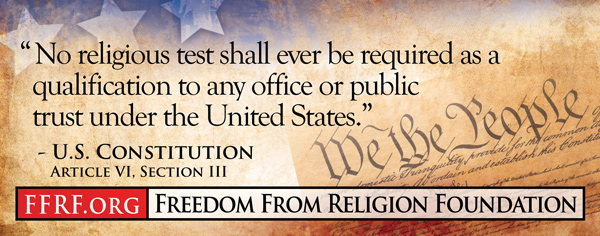
You need to get rid of your discriminatory and exclusionary oath, the Freedom From Religion Foundation is recommending to the state of New Jersey.
New Jersey statutes require a religious oath to assume any state office. As required by N.J.S.A. 41: 1-2: “Every person who shall be appointed or elected to any office . . . under the authority of [the] state . . . shall . . . take and subscribe the oath of allegiance prescribed by section 41:1-1.” The oath in section 41:1-1 requires the person assuming office to “solemnly swear (or affirm)” to uphold the U.S. and New Jersey Constitutions. The oath ends with “So help me God.”
An individual is required to sign this oath to qualify to be placed on the ballot for an election. When the Division of Elections was contacted regarding an alternative to the religious oath, the division responded that it didn’t allow for a secular affirmation because the oath was required by state statute.
An affirmation is parenthetically allowed in the statute in place of an oath, FFRF points out. This is an important distinction because an oath is a declaration or pledge to a god, while an affirmation is a solemn vow without reference to a religious entity. Requiring a reference to “God” is contrary to parenthetically suggesting an affirmation is allowed, FFRF maintains. And that’s the least of it.
“First and foremost, Article 6 of the United States Constitution prohibits the government from requiring any kind of religious test for public office,” FFRF Legal Fellow Karen Heineman writes to New Jersey Acting Attorney General Matthew J. Platkin. “In the bedrock case examining a requirement for an oath for public office, the U.S. Supreme Court held that ‘neither a state nor the federal government can constitutionally force a person “to profess a belief or disbelief in any religion.’ … Likewise, requiring someone who is running for elected office in New Jersey to profess to a god in which they do not believe would make a mockery out of the oath and the solemn promise to support the Constitution.”
In addition, the New Jersey Constitution mirrors the federal Constitution by prohibiting a religious test “as a qualification for any office or public trust,” (Article I, paragraph 4). And the oath for state legislators is defined and does not reference any god. (Article IV, section VIII, paragraph 1). This section also specifically states that an oath or affirmation is allowed. Plus, the state Constitution allows for an oath or affirmation for public officers and employees (Article VII, section I, paragraph 1).
FFRF successfully brought suit recently in federal court against the state of Alabama for requiring voters to sign a statement on the voter registration form that ended with “so help me God” with no secular option offered. The state responded to our initial communications by disingenuously stating there were no alternatives. The case was settled, and the form now includes an option to decline the last four words.
Citizens cannot be forced to pose as religious or violate their freedom of conscience in order to exercise a basic right, FFRF asserts. This is the reason New Jersey cannot require a citizen who wants to run for political office to swear to a god to gain access to the ballot. A secular affirmation must be offered as an option when an oath is required for a public office, including the right to run for office, FFRF concludes. That’s why the state/church watchdog is asking the New Jersey attorney general’s office to inform it of the process by which a candidate for office may choose a secular affirmation.
“Our secular Constitution bars any religious test for public office, and that’s what this oath amounts to,” says FFRF Co-President Annie Laurie Gaylor. “This needs to be fixed to bring the Garden State into the secular age.”
Read FFRF’s letter to the New Jersey acting attorney general here.
The Freedom From Religion Foundation is a national nonprofit organization with more than 36,000 members, including nearly 700 members in New Jersey. Our purposes are to protect the constitutional principle of separation between state and church, and to educate the public on matters relating to nontheism.

